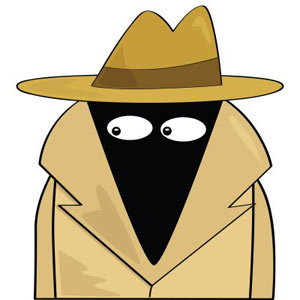Poker Bluff – The Ultimate Guide to Bluffing in Poker
 Executing a successful Poker Bluff, whether it is at a live poker table or while playing online poker, is one of the most exciting and intriguing parts of the game.
Executing a successful Poker Bluff, whether it is at a live poker table or while playing online poker, is one of the most exciting and intriguing parts of the game.
Trying to decide if you are being bluffed is just as hard as trying to figure out when the best time is that you should be bluffing in Poker.
Bluffs are not easy, and they are one of those things where you may never know for sure if you are being bluffed or if you can get away with a bluff until after you have made a decision. However there are things you can do and watch for to help you make the correct decision more often.
One thing you are forced to overcome while playing online poker is that you can’t get a physical read on your opponent based on their voice, body language or physical actions. In other words you can’t get a read or “feel” for what they are doing.
The main way to overcome this is to learn and track their playing tendencies and patterns. You can track these observations by taking poker notes on players you come up against so that next time you face them you have a head start.
Becoming a Bluffing Master is easier said than done but here are some ways to help you pick off possible bluffs and get away with your own bluffs.
A Poker Bluff is when you make a bet or raise in an attempt to represent a different or stronger hand than you are holding to your opponents. The objective of Bluffing is to get your opponent to fold so that you win the pot without having to show your hand.
How to Know When to Execute a Poker Bluff
If you are like many budding poker players, you watch poker on television all of the time. On televised poker tournaments, you often see players pull of bluffs in big pots. This leads many beginning players to believe that bluffing happens all of the time at the poker table.
While bluffing does happen at every poker table around the world from time to time, it does not happen on every hand, or even close to every hand. The reason such a high percentage of hands shown on television involve bluffs is because they’re entertaining to watch. The televised poker tournaments only show a small percentage of the hands played so they pick the most exciting ones to air.
Don’t fall into the trap of bluffing too often. The best poker players don’t bluff very often at all, they pick and choose their moments. If you bluff too much, observant opponents will stop folding to your bluffs, and that will cost you a lot of money.
On the other hand. if you never bluff then the same observant opponents will know to fold to your bet on the river, and you’ll still lose a lot of money that you could of won.
So the key is to find the right opportunities to bluff occasionally while not bluffing too much. So how DO you pick the correct times to bluff?
Your biggest weapon is learning how your opponents play and spotting patterns that you can exploit….
- Will they fold to a bet late in a hand?
- What exactly happened leading up to their fold?
- Did they obviously miss on their flush draw or were they drawing to something else?
These are all actions that can give you clues to how they will play future hands. You are looking at when they are folding and the situation that lead up to that fold. Then the next time that situation arises against the same opponent you can exploit that information and re-enact the events that lead up to the previous fold to get your opponent to fold once again.
This is just one of the many reasons that you need to pay attention to how all of your opponents play on every hand, whether you are involved in the hand or not.
Bluffs in some circumstances have a much higher chance of working than in other circumstances. One situation that comes up often is when you’re in late position and three of you see the flop. If it is checked around to you, you should almost always bet in position no matter what you hold. Unless one of the other two players hit a monster on the flop and are trapping, the likelihood is that your opponents missed the flop and you will take the pot down with a bet the majority of the time.
Semi Bluffing Online
Because it is so hard for beginning players to know when the right time to bluff is, the best way to start is by using semi bluffs.
A Semi Bluff is when you have a decent hand that may or may not be the best possible hand, but you also have a draw to a much better hand.
For example you have the Ace and Ten of hearts and the flop is Jack of hearts, Ten of clubs, Three of hearts. You hold middle pair and a four card draw to a heart flush. Your middle pair may be the best hand, but because it is not particularly strong it may not be.
By betting here, you are semi bluffing, giving yourself three ways to win the pot.
- Your Middle Pair may be good enough to win the hand
- Your opponent might be beating your middle pair, but you may hit your flush draw on the turn or river to win the hand.
- Your opponent may simply fold to your Semi Bluff bet.
If your opponent bets into you it is often a good time to raise. Of course, if you know how your opponent plays and he or she only bets into you with a made hand, then you would know that a raise would not be correct. Then you would have to see if you are receiving the correct pot odds to call the bet.
However if you do raise and your opponent just calls, it is hard for them to put you on a flush draw because usually you would have just called with a flush draw. So if your flush is completed on the turn or river you may be able to get some extra money from your opponent as your hand is disguised.
The Scare Card Bluff
Another good time to consider making a bluff is when a scare card hits. If the turn or river possibly completes a flush or straight, then you can represent hitting that Flush or Straight to your opponents by making a bet. Of course this runs the risk of backfiring if your opponent has actually hit the exact hand that you are representing.
The best bet to make when a scare card hits is the exact same bet you make when you are drawing to a better hand and hit it. For example, if three hands back you were chasing a flush and hit it, you should remember how you played it (and how your observant opponent will remember you playing it) and play the hand you are bluffing in exactly the same way. This way your opponent can’t know whether you hit the flush again or are bluffing.
Bluffing and Your Table Image
Your table image also has a great deal to do with how likely your bluffs are to succeed. Your table image is how the rest of the table views your playing tendencies and abilities.
If you are viewed as a loose player that bluffs a lot, you don’t have a very good chance to make a bluff work. But you can probably get paid off on your good hands because everyone will think you are bluffing.
On the other hand, if the rest of the table views you as a solid player who almost never bluffs, you have a good chance to make a bluff work in the right situation.
You must be aware at all times of how active you have been in the current session and how the table might view you. This may be completely different to reality, for example, you may have been involved in the majority of the past 10 hands, and won the pot in a lot of them. To the other players at the table you will be perceived as a loose player who might be bluffing a lot to win those pots, but in reality you may have just had a good run of cards. The important thing is to get inside your opponents mind and understand at any moment in time, how they are perceiving you.
How to Size Your Bets When You’re Bluffing in Online Poker
The size of your bluff bet is also an important consideration. Most newer poker players think that a big bet is required to make a bluff work and by betting large amounts it increases the pressure on an opponent to fold. This is not the case, especially against a good opponent.
In the right situation a small bluff bet can be more effective than a large one. A good player will often consider a small bet a trap and a large bet a bluff. Of course this is not always the case, but just be aware that you don’t have to make a big bet to make a bluff work.
As an example, in a recent hand, I got a guy to lay down top pair for only a $25 bet into a $200 pot on the river. I had been playing tight and hadn’t had to show any bluffs and had played the hand like I was leading the whole way. My hand was only second pair but I had set the whole bluff so well that it was successful and the smaller bet probably actually helped reinforce the story I was selling to my opponent.
If I had made a much larger bet he might of thought I was trying to buy the pot at the end. No one attempts to buy a pot for around 10% of the pot, so it worked. Of course he should have called for such a small bet no matter what, but I was able to take advantage of the situation.
How to Know When You are Being Bluffed
Knowing when you are being bluffed involves examining the situation and all the information you have built up on your opponents (this is where your notes come in handy).
- How the hand has played out to this point, what is the pattern of actions.
- What do you know about your opponents style & tendencies.
- What range of hands your opponent is likely to have based on the pattern of actions and what you know about your opponent.
- You also have to consider the size of the bet in comparison to the size of the pot and then compare that against the percentage chance that you are being bluffed.
As you can see, it can quickly get complicated when trying to determine if you are facing a bluff, especially when you have limited time to make a decision.
A large leak in many players games is assuming they are always being bluffed out of a pot. When you start feeling like everyone is bluffing you, you start making too many calls when your opponents have a made hand.
One thing that leads to being bluffed often is playing in a passive manner. By letting an opponent lead the action, you are opening yourself up to being bluffed. If you are playing a bit more aggressively, it will be you leading the action more. You will still be bluffed at times but your opponents will not have as many opportunities to take pots by bluffing, because they are too busy working out what your bets mean.
The best advice I can give you is that it takes a lot of experience, work and observation to learn how to spot bluffs. Take everything you have learned above about how to make a bluff work and consider it from the other side of the fence to see if you can pick up clues as to when an opponent may be trying to bluff you.
Remember to always consider the playing ability of your opponent. The better player they are the harder it is to tell if they are bluffing or really have a hand.
I’m not Bluffing You… Honest!
There are no hard and fast rules or percentages on how often you should bluff. But a good place to start until you learn which players can be bluffed and when your bluffs have the best chance to succeed is to bluff no more than 10 to 15% of the time.
If you include semi bluffs (which you should) then you will rarely make a true bluff. This is the best way to have your occasional bluff work. If your opponents don’t think you ever bluff or are sure that you almost never bluff, you are in the perfect position to make one work.
Finally, if you have recently been caught bluffing it is a good idea to not try another bluff for quite a while. When you do get caught bluffing, you can usually use this to your advantage by acting like you are bluffing a little later when you have a made hand. This can pick up a couple extra bets to make up for your loss on the busted bluff.
I think that pulling off a bluff to win a big pot is one of the most exciting, tantalising and heart pounding moments in a poker game. Now armed with the above information you can see if you agree.
For some further information take a look at our article on 5 Situations to use a Poker Bluff.

Trust & Security
I'll only recommend Safe & Trusted sites with a proven track record
By Game Type
Different rooms are better for different game types & stakes
Beginner Friendly
I'll find you a site with players of a similar skill level
Promotions
I'll find you the best value Promotions, Bonus & Freebies!

 Return to the
Return to the 
